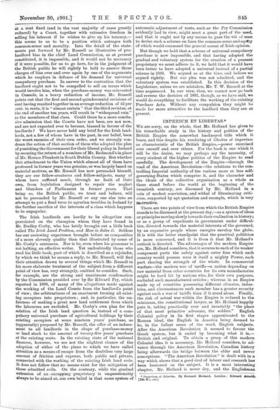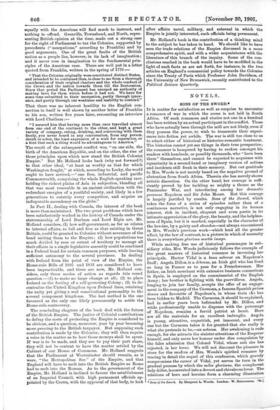IMPERILTM ET LIBERTAS.*
WE are sorry, on the whole, that Mr. Holland has given to his remarkable study in the history and politics of the British Empire the somewhat hackneyed title which it bears, and this despite his rendering of libertas et imperium as characteristic of the British Empire,—power exercised over oneself and over others. For the book is one which it will be the desire, we may perhaps say the necessity, of every student of the higher politics of the Empire to read carefully. The development of the Empire—through the road of the American Revolution—the relations to the con- trolling Imperial authority of the various more or less self- governing States which comprise it, and the character and the ideals of the collective organisation as a whole as these stand before the world at the beginning of the twentieth century, are discussed by Mr. Holland in a vein of modest conviction, and withal of illuminating criti- cism, supported by apt quotation and example, which is very instructive.
There are two points of view from which the British Empire stands to be discussed at the present day,—as a system of ideas or principles moving slowly towards their realisation in history; or as a group of expedients in government under difficul- ties, directed towards the material interests of the governed, by an expansive people whose energies envelop the globe. It is with the latter standpoint that the practical politician is more concerned, and it is from it that Mr. Holland's outlook is directed. The advantages of the modern Empire are, Mr. Holland considers, that it secures to each of its weaker component parts the safety against outer foes which each country would possess were it itself a mighty Power, each part sharing the strength of the whole. In commercial warfare—the modern war of tariffs—a nation depending on raw material from other countries for its own manufactories might be hard hit by nations who, for their own purposes, excluded such manufactured articles ; whereas in an Empire made up of countries possessing different climates, indus- tries, and circumstances each member has a greater security against such a war of tariffs than if it stood alone. Finally, the risk of actual war within the Empire is reduced to the minimum, the constitutional lawyer, as Mr. Holland happily puts it, taking practically ever and invariably "the place of that most primitive advocate, the soldier." English Colonial policy in its first stages approximated to the Roman ideal, the English in America being deemed to be, in the fullest sense of the word, English subjects. After the American Revolution it seemed to favour the Greek system, but it ended by becoming what it is,— British and original. To obtain a grasp of this modern Colonial idea it is necessary, Mr. Holland considers, to ad- vance through the American Revolution, Canadian history
being afterwards the bridge between the older and newer conceptions. " The American Revolution " is dealt with in a way which shows that a good deal of labour and research has been bestowed on the subject. It is a most interesting chapter. Mr. Holland is never dry, and the Englishman
• I:nen-ism et Libertes. By Bernard Holland. London : Edward Arnold. r12s. 62..et.1
equally with the American will find much to instruct, and nothing to offend. Grenville, Townshend, and North, repre- senting British opinion at the time, made out a strong case for the right of Parliament to tax the Colonies, supported by precedents (" usurpations," according to Franklin) and by good arguments. One of the great faults of the British nation as a people lies, however, in its lack of imagination ; and it never rose in imagination to the fundamental prin- ciples of the American case. These are well put in a letter quoted from Franklin, written in the spring of 1770 :—
"That the Colonies originally were constituted distinct States, and intended to be continued thus, is clear to me from a thorough consideration of their original charters and the whole conduct of the Crown and the nation towards them till the Restoration. Since that period the Parliament has usurped an authority of making laws for them which before it had not. We have for some time submitted to their usurpation, partly through ignor- ance, and partly through our weakness and inability to contend."
That there was no inherent hostility to the English con- nection in itself is well shown by another letter of Franklin to his son, written five years later, recounting an interview with Lord Chatham :-
"I assured him that having more than once travelled almost from one end of the continent to the other, and kept a great variety of company, eating, drinking, and conversing with them freely, you never heard in any conversation, from any person. drunk or sober, the least expression of a wish for separation, or a hint that such a thing would be advantageous to America."
The result of the subsequent conflict was, "on one side, the birth of the American Republic, and on the other, the rise of those principles upon which now stand the British Colonial Empire." But Mr. Holland looks back (why not forward P) to that other ideal, "at least as worthy as that for which Washington fought," at which, according to Lecky, the world ought to have arrived,—" one free, industrial, and pacific Commonwealth, comprising the whole English-speaking race, holding the richest plains of Asia in subjection, blending all that was most venerable in an ancient civilisation with the redundant energies of a youthful society, and likely in a few generations to outstrip every competitor, and acquire an indisputable ascendency on the globe."
In Part IL, dealing with Canada, the interest of the book is more than maintained. The two great problems which have been satisfactorily worked in the history of Canada under the statesmanship of Lord Durham and Lord Elgin are, Mr. Holland considers, (1) how self-government, as far as relates to internal affairs, as full and free as that existing in Great Britain, could be granted to Colonies without severance of the bond uniting them to the Empire ; (2) how populations too much divided by race or extent of territory to manage all their affairs in a single legislative assembly could be combined in a Federal bond for certain common purposes, while leaving sufficient autonomy to the several provinces. In dealing with Ireland from the point of view of the Empire, the Home-rule Bills of 1836 and 1833 are considered to have been impracticable, and there are now, Mr. Holland con- siders, only three modes of action as regards this vexed question :—(1) to make no large change at all; (2) to place Ireland on the footing of a self-governing Colony ; (3) to de- centralise the United Kingdom upon Federal lines, retaining the unity yet giving a real constitutional personality to the several component kingdoms. The last method is the one favoured as the only one likely permanently to settle the Home-rule controversy.
The concluding chapters of the book deal with the future of the British Empire. The justice of Colonial contributions to defray the costs of protecting the Empire is considered to be obvious, and a question, moreover, year by year becoming more pressing to the British taxpayer. But supposing such contribution is made by the Colonies ; they will then require a voice in the matter as to how those moneys shall be spent.
If war is to be made, and they are to pay their part share, they will not be content to have the matter settled by the Cabinet of our House of Commons. Mr. Holland suggests that the Parliament at Westminster should remain, as it were, "the Metropolitan See" of the Empire, and that England will have to melt into the British Empire as Rome had to melt into the Roman. As to the government of the Empire, Mr. Holland is inclined to favour the establishment of an Imperial Council, with high permanent officials ap- pointed by the Crown, with the approval of that body, to look after affairs naval, military, and external in which the Empire is jointly interested, such officials being permanent.
Mr. Holland's book is the contribution of a thinking mind to the subject he has taken in hand. We should like to have seen the trade relations of the Empire discussed in a more comprehensive spirit, and with a wider acquaintance with the literature of this branch of the inquiry. Some of the con- clusions reached in the book would have to be modified in the light of such facts as are set forth, for instance, in the two. articles on England's commercial policy towards the Colonies. since the Treaty of Paris which Professor John Davidson, of the University of New Brunswick, recently contributed to the Political Science Quarterly.















































 Previous page
Previous page